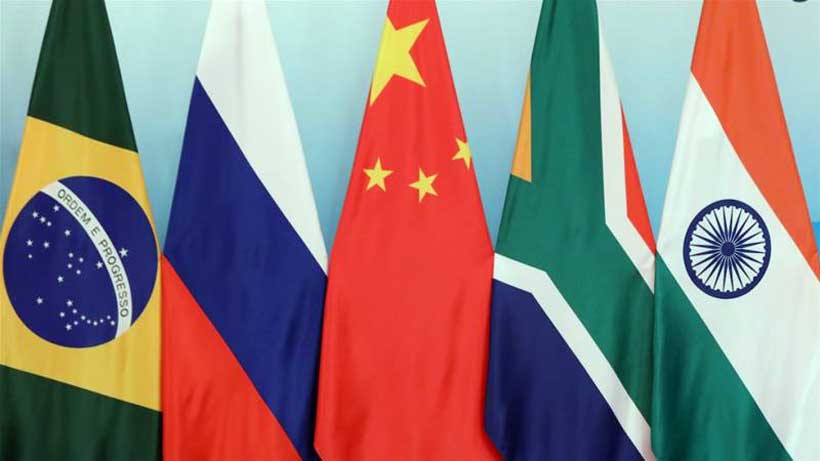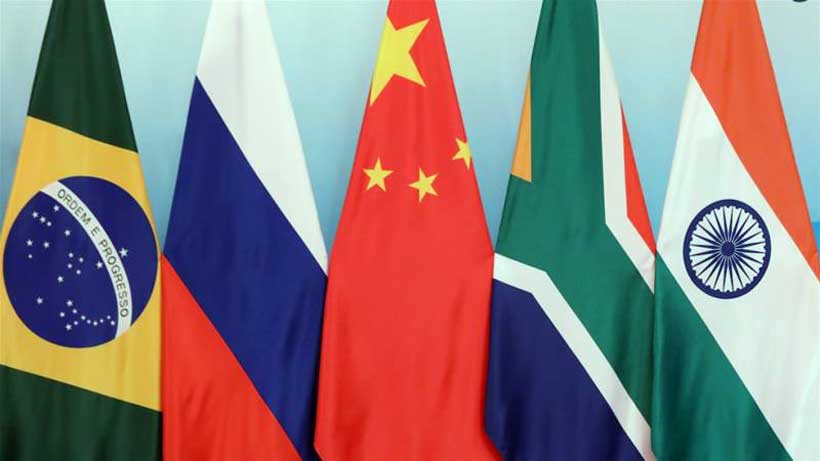Black_cats
ELITE MEMBER

- Joined
- Dec 31, 2010
- Messages
- 10,031
- Reaction score
- -5
Bangladesh in the BRICS Bloc: New Dynamics in Economic Partnership

Bangladesh has shown interest to become a member of the BRICS (Brazil, Russia, India, China, and South Africa) bloc. Although some of the bloc members seek to establish an alternative global order that challenges the prevailing dominance of the United States and the US dollar, Bangladesh is currently evaluating the economic advantages of its membership within the bloc and not engaging into any bloc confrontation.
Bangladesh is presently engaged in the pursuit of economic diplomacy as a means to implement Vision 2041 and achieve the status of a developed economy. Subsequently, Bangladesh has undertaken multiple initiatives to organize its economy and infrastructure. Moreover, Bangladesh’s decision to align with BRICS encompasses various dimensions, including diplomatic, political, and economic considerations.
The BRICS countries have the potential to enhance economic cooperation and trade opportunities for Bangladesh. The BRICS nations collectively possess a population exceeding 3 billion and hold substantial portion of the global GDP. Currently, Bangladesh has GDP of USD 425.5 billion and growth rate of 5.3%. The inclusion of Bangladesh in BRICS has the potential to bolster its trade relations, entice foreign direct investment (FDI), and facilitate access to untapped export markets. In April 2023, China exported $2.08 billion and imported $82.3 million from Bangladesh, resulting in positive trade balance of $2 billion. Bangladesh holds the position of being India’s most significant trading partner within the subcontinent, while India ranks as the second largest export partner for Bangladesh, contributing to approximately 12% of the overall exports to the country. The overall trade volume for the period of 2021-2022 reached value of US$18.2 billion. The trade volume between Bangladesh and the other three BRICS countries, namely Brazil, Russia, and South Africa, was comparatively modest. Specifically, the trade value amounted to $0.3 billion with Brazil, $0.2 billion with Russia, and $0.1 billion with South Africa.
Bangladesh is currently seeking to broaden its foreign relations, a pursuit that holds significant strategic possibilities. By becoming a member of the bloc, Bangladesh has the opportunity to leverage this platform to enhance collaboration in the areas of infrastructure and sustainable development. In 2015, NDB extended its membership to Bangladesh, thereby accepting it as new member. It is anticipated that the New Development Bank (NDB) will extend a loan of $2 billion to Bangladesh to execute eight development projects. The Dhaka Water and Sewerage Authority has also received approval from the NDB for a $235 million loan to fund water supply project. Additionally, a loan of $442 million has been granted to address the maintenance and replacement needs of leaky gas pipelines in Dhaka and Narayanganj.
Bangladesh stands to gain diplomatic advantages through its participation in the BRICS nations and its commitment to upholding the principles of multilateralism. It can engage in the BRICS dialogues and initiatives about a range of shared concerns, including but not limited to trade, investment, climate change, health, and security. Bangladesh has the potential to contribute its knowledge and proficiency across multiple domains, including poverty alleviation, disaster mitigation, climate resilience, and social advancement. The bloc can provide Bangladesh various initiatives and projects undertaken by BRICS, including the BRICS Contingent Reserve Arrangement (CRA)and the BRICS Business Council. The BRICS alliance has the potential to serve as strategic entry point for Bangladesh into the markets of South Africa and Latin America through various means. Presently, bilateral trade between Bangladesh and South Africa, as well as Latin America, is significantly limited, constituting less than 1% of Bangladesh’s overall trade volume. By becoming a member of BRICS, Bangladesh stands to gain advantages from the preferential trade agreements and tariff concessions that the bloc has established with these regions. In addition, the inclusion of Bangladesh in BRICS could potentially yield advantages in the event of a scarcity of US dollars to import coal and other energy resources to fulfill its energy requirements.
From a geopolitical perspective, this would enable Bangladesh to align itself with a consortium of influential emerging economies, potentially bolstering its capacity to negotiate in regional and global forums. Bangladesh actively fosters regional and global cooperation and stability from a regional standpoint. For example, Bangladesh has already become a part of the Belt and Road Initiative (BRI), initiated by China, to bolster connectivity and foster economic collaboration between the continents of Asia and Europe. Bangladesh actively participates in various regional organizations, including SAARC and BIMSTEC to foster regional integration, facilitate trade, and foster economic development. Bangladesh joining the bloc would enhance the connectivity of BRICS countries with other nations within the region as well as globally. The potential inclusion of Bangladesh in BRICS could act as tactical counterbalance to the influence other regional powers have over the South Asian region. The BRICS alliance has the potential to act as a strategic platform for Bangladesh to counteract the influence that countries like India and China exert due to their combined influence and economic strength. This would result in a broader array of partnerships and relationships, fostering greater diversity in Bangladesh’s international engagements.
However, the inclusion of Bangladesh in the BRICS could potentially present certain challenges. Firstly, Bangladesh would need to establish an equilibrium in its diplomatic interactions with the BRICS nations and other key stakeholders, including the United States, the European Union, and Japan. Additionally, Bangladesh would need to address economic and political competition and rivalry within the BRICS countries, particularly between India and China and maintain its neutrality which is enshrined in its constitution. Finally, Bangladesh may need to evaluate potential repercussions from Western nations, particularly the United States, which may interpret Bangladesh’s decision to join BRICS as indicative shift from the Western bloc in its politics.
In conclusion, it can be noted that Bangladesh is actively pursuing its economic interests to foster constructive alliances with diverse nations, which encompasses its participation in the BRICS bloc. In addition, Bangladesh is prioritizing diplomatic endeavors to effectively address concerns and uphold open lines of communication, thereby effectively managing and mitigating potential conflicts of interest within the bloc.

Aishwarya Sanjukta Roy Proma
Aishwarya Sanjukta Roy Proma is a Research Associate at the BRAC Institute of Governance and Development (BIGD). She is a research analyst in security studies. She obtained her Master's and Bachelor's in International Relations from the University of Dhaka, Bangladesh. She can be reached at ash77662[at]gmail.com

Bangladesh in the BRICS Bloc: New Dynamics in Economic Partnership - Modern Diplomacy
Bangladesh has shown interest to become a member of the BRICS (Brazil, Russia, India, China, and South Africa) bloc. Although some
moderndiplomacy.eu





